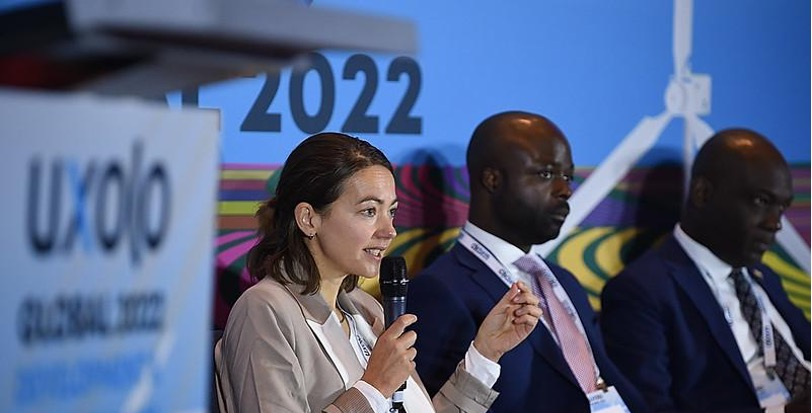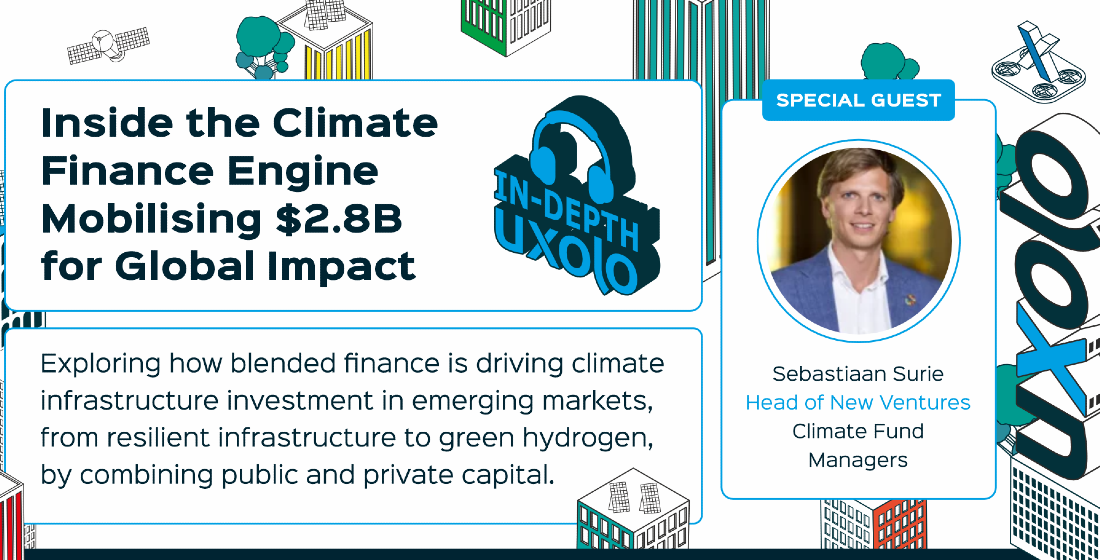Uxolo Global 2022: Event takeaways
At its first global event, Uxolo welcomed DFIs, MDBs, commercial investors, impact investors, pensions funds, and asset managers to The Hague for a full day of discussion. The main question: how can the development finance industry scale up the flow of private finance to emerging markets?

At the first panel of Uxolo's conference last week, moderated by Texel, we heard from keynote DFI speakers representing BII, EBRD, FMO and Afreximbank that discussed the huge issue of getting scale to mobilise private capital towards emerging markets. As shown by our data, ECAs have increasingly moved to developed markets, and DFIs alone cannot fill the gap. Accessing impact finance as allocated by some institutional investors remains limited however, as some pension funds for example are restricted in how much they can allocate to emerging markets (sometimes only 2-3%).
One solution could be on a portfolio level, where a DFI guarantees an entire portfolio, and an investor provides capital into the portfolio as a whole, rather than specific projects. IFC and AfDB have already begun exploring this route. Another option could be bundling GSS bonds together and again, bringing in external capital that way.
Institutional partnerships were also, unsurprisingly, a big trend. The size of the capital that needs to be provided, whether in terms of ESG, poverty alleviation or infrastructure transformations, is so large that no one group of institutions can do it alone. One example of a very good partnership has been Afreximbank’s reinsurance of their entire portfolio using Marsh. Now everyone knows exactly how to access the programme, and dealing with a single insurance broker simplified the process.
In the second panel we heard from the private investment side on de-risking development in emerging markets which was moderated by ImpactA Global with speakers representing Signature Agri Investments, GIF, and Allianz Global. One speaker added that the role of DFIs in providing first losses and junior capital remained essential.They outlined that a DFI first loss catalysed a 1:39 ratio of private capital mobilisation, and a second loss a 1:2.
Another speaker commented that the DFIs needed to stick to their mandates in investing in emerging markets and mobilising private capital, and not let policy get in the way. Local lenders know their area, and often know what financial structures will work. This local connection and ability to do due diligence on ground is also a reassurance to private investors who commented on their appreciation of DFIs sharing lessons learned on resilient financial structuring - a necessity with emerging markets.
After the morning networking break, the delegates returned for a discussion on mobilising the private sector with PPPs. Moderated by Delphos, the speakers from GIF, FinDev Canada, OECD and Bechtel discussed the huge challenge in creating enough pipeline for potential private investors. One option could be to see if investors might be prepared to allocate funds further up the chain, liaising with governments directly to create more projects and providing funds for capacity building.
Another takeaway was that DFIs needed to do a better job pricing their service into projects. Some DFIs do not charge at market rates, and so projects are not given as much attention as they should be. There is a growing trend of younger, more commercial DFIs pricing their services into deals. Commentators were watching this space, eager to see whether this could lead to, ideally, shorter lead times to project closes.
Upstairs in the Van-Gogh breakout room, speakers from Eighteen East Capital, FMO, and FCDO, moderated by MOBILIST, led a data-driven workshop on mobilising private capital through public exits. DFIs are adding to the flexibility of instruments that they deploy, and one aspect of this discussion centred on the current quality of data. There is an admission that there is not enough consistent data to attract private capital or institutional investors at scale. Part of that comes down to consistent labelling and definitions, but also DFIs have access to a database (GEMS) that impact investors and private capital cannot access. With DFIs addressing the need to take stock of their capabilities, opening up about portfolio sizes and default rates would have a substantial influence on investor confidence and risk perception.
Meanwhile in the plenary, BII, FMO, and Climate Policy Initiative addressed the great green energy transition, moderated by BPL Global. Just transition was the key term for this session, with all speakers recognising the complexity of transitioning from brown to green energy without collapsing the economic value chain, the labour and services, already in place. This was a particularly poignant issue when discussing Africa, the focus of COP27, as leaders have already expressed their need for energy to continue alleviating poverty. One speaker commented that getting renewables in emerging markets funded by institutional investors continued to face significant competition from the more bankable green opportunities available in Europe and North America. Even in Uxolo’s data, the region that receives the most DFI capital is Europe, with Africa around $4 billion behind.
Upstairs, another workshop began discussing the ESG taxonomy, with speakers from OeEB, SilverStreet Capital, and HELIOS Group moderated by Allianz Global. They discussed the need to balance the breadth, depth, and success of impact when assessing potential investments. One speaker addressed how this could be improved by not positively or negatively screening but affirmatively seeking direct, impactful investments. Attention was also drawn to the fact that when there are supply chain disruptions, there is an extreme urgency in driving funding before crises become worse and potentially unmanageable.
After lunch, there were three more sessions in the plenary before the drinks reception. The afternoon began with a presentation by EBRD on the worsening debt crisis, inflation, and post-pandemic purse strings. Through detailed graphs, the speaker warned that inflation had not peaked yet; higher producer goods were only beginning to be passed down to consumers. Current account deficits were also at their highest rate since 2008, and global social unrest was increasing dramatically.
Then Uxolo moderated the next session with speakers representing Calvert Impact Capital, ImpactA Global, MCE Social Capital, and Chemonics to discuss ethical investing. One takeaway from this session was that inequality was an inhibitor of growth; preventing the concentration of capital into too few hands was both a social and financial imperative. A standout quote was “if you do what you’ve always done, you’ll get what you always got”.
The final session focused on Latin America and the Caribbean, with a panel moderated by Delphos and spoken at by Exagon Impact Capital and OPEC Fund. The speakers highlighted that FDI into the region had grown by 56% to $134 billion in 2021. Moreover, more venture capital ($16 billion) was directed towards the region than the entire decade prior - the majority of this went to fintech and e-commerce startups. One speaker also mentioned the huge potential of distributed generation.
Another takeaway from this session was that DFIs needed to push LATAM governments to implement their green policies. One speaker said there was a middle market opportunity here, citing a successful 4G energy project in Colombia that was dependent on the involvement of the government who provided an investment grade credit risk.
After a jam-packed day, the event wound down with closing remarks and a drinks reception. The full list of sessions, delegates, and speakers can be found on the Uxolo Global 2022 online lobby.





